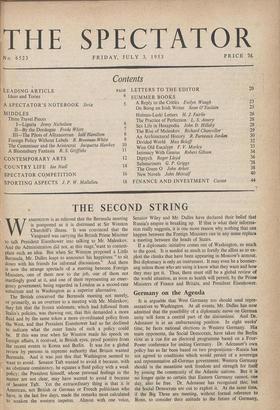THE SECOND STRING
WASHINGTON is as relieved that the Bermuda meeting is postponed as it is distressed at Sir Winston Churchill's illness. It was convinced that the Vanguard was carrying the British Prime Minister to talk President Eisenhower into talking to Mr. Malenkov. And the Administration did not, at this stage,'want to contem- plate such an idea. But when Sir Winston proposed a Little Bermuda, Mr. Dulles leapt to announce his happiness " to sit down with his friends for informal discussions." And there is now the strange spectacle of a meeting between Foreign Ministers, one of them new to the job, one of them not startlingly good at it, and one of them representing an emer- gency government, being regarded in London as a second-rate substitute and in Washington as a superior alternative.
The British conceived the Bermuda meeting not merely, or primarily, as an overture to a meeting with Mr. Malenkov; they felt that the frozen stalemate, which had followed from Stalin's policies, was thawing out, that this demanded a more fluid and by the same token a more co-ordinated policy from the West, and that President Eisenhower had so far declined to indicate what the outer limits of such a policy could be. If this was true when Sir Winston made his speech on foreign affairs, it received, in British eyes, proof positive from the recent events in Korea and Berlin. It was for a global review by persons in supreme authority that Britain wanted Bermuda. And it was just this that Washington seemed to want to avoid. Senator Taft wanted to avoid it because, with an obstinate consistency, he equates a fluid policy with a weak policy; the President himself, whose personal feelings in the Matter are not clear, may have wanted to avoid it because of Senator Taft. Yet the extraordinary thing is that it is American, not British or German or French politicians who have, in the last few days, made the remarks most calculated to weaken the western impetus. Almost with one voice, Senator Wiley and Mr. Dulles have declared their belief that Russia's empire is breaking up. If that is what their informa- tion really suggests, it is one more reason why nothing that can happen between the Foreign Ministers can in any sense replace a meeting between the heads of States.
If a diplomatic initiative comes out of Washington, so much to the good. It is needed as much to fortify the allies as to ex- ploit the chinks that have been appearing in Moscow's armour. But diplomacy is only an instrument. It may even be a boomer- ang unless those who are using it know what they want and how they may get it. Thus, there must still be a global review of the world situation, as soon as health will permit, by the Prime Ministers of France and Britain, and President Eisenhower.


























































 Previous page
Previous page